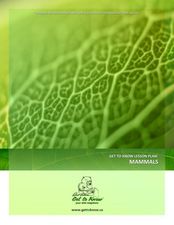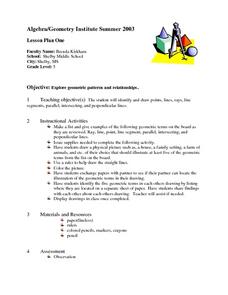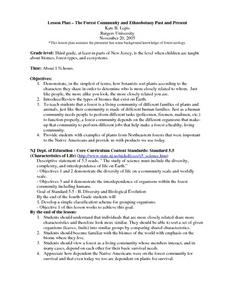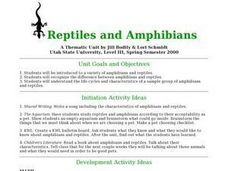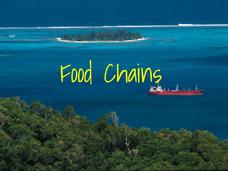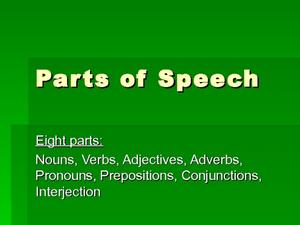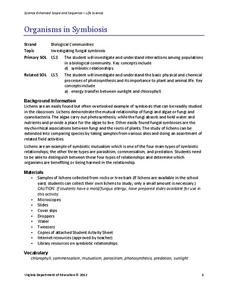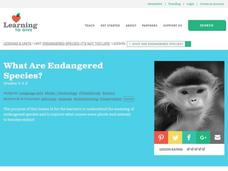Curated OER
Get to Know: Mammals
Students discover the mammals in their community. In this animal lesson, students survey their school grounds for signs of mammals. Students examine tracks, droppings, and other signs of wildlife to learn more about the animals and their...
Curated OER
Introduction to Trigonometry
Students identify the six trigonometric ratios and properties. In this trig lesson, students define basic trig functions as it relates to solving right triangles. They identify the equation for sine as o/h and cosine as a/h and tangent...
Curated OER
Teaching Kids about the Environment
Fifth graders identify the species of plants and animals found in an environment. They compare these findings to plant and animal species found in an unlike environment. Students acquire and compare soil samples from the two sites chosen.
Curated OER
Garden of Eden
Students view a video clip about animals and their habitats. They work together to discuss how different animals adapt to their environments. They create a new habitat for a specific animal and draw new adaptations for them.
Curated OER
The "How's and Whys" of Animal Behavior
Students read examples of behaviors in various animals. They design an experimental question about the behavior. They explain if the question involves the proximate or ultimate level of causation.
Curated OER
To Eat or Not to Eat?
Students identify various parts of plants and determine which parts people eat. They conduct a celery stalk experiment in which they determine the value and use of the stem, and how it helps the plant to meet its needs. Students use a...
Curated OER
Lesson Plan One: Points, Lines, Rays
Fifth graders explore basic geometric terms. Pupils draw a physical picture of a scene that illustrates at least five geometric terms. Partners exchange drawings and locate the illustration of geometric terms in the drawing.
Curated OER
The Forest Community And Ethnobotany Past And Present
Students describe a forest as a living community. They determine members interact, and in many cases, depend on each other for their basic survival needs. They investigate how dependent the Native Americans were on the forest...
Curated OER
The Anaconda
Young scholars examine basic facts about the anaconda. They discuss the length of an anaconda, estimate the length of 33 feet, compare their estimate to the actual length, and decorate the paper snake with colored scales.
Curated OER
Food Chains
Have your class discuss food chains using this presentation. This resource goes through a step by step exploration of plants and the food chain. It talks about the energy of the sun, producers and consumers, herbivores and carnivores,...
Curated OER
Parts of Speech
This basic presentation gives students examples of a variety of parts of speech including: conjunctions, interjections, adverbs, adjectives, nouns, verbs, and prepositions. Each slide uses the part of speech in a sentence. This would be...
Curated OER
A Rainbow Under the Sea: How Do Animals Survive in the Ocean?
Second graders, with adult help, create a PowerPoint presentation on a selected ocean animal.
Curated OER
Number Families
First graders examine the relationship between numbers and number families. They listen to the poem "Kangaroo and Toad" by Shel Silverstein and create a list of the largest animals they can think of. Students then order the animals...
Curated OER
The Bear Necessities: A K-2 Computer Activity
Students demonstrate understanding of basic facts of polar bears based on their completed worksheets. They then demonstrate basic skill at scrolling on a Web page and identify key points in text.
Curated OER
This Is Tree-rific!
Third graders view a clip of the video Backyard Safari, "Trees," and portray the life cycle of a tree. They also view a clip on structures of a tree and draw a diagram of a tree in their science journals.
Curated OER
Prairie Field Trip
Learners study prairie conservation and the plant and animal life within. In this prairie life lesson students divide into groups and complete a lab activity.
Re Energy
Build Your Own Biogas Generator
What is biogas and how is it made? After examining background information about the sources of biogas and biogas generators, class members follow the provided information and build a biogas generator that can be used in the classroom.
CK-12 Foundation
Seafloor: Sonar Boats
An interactive that teaches about sonar sure sounds like fun! Junior oceanographers study the uses of sonar, past and present, in an engaging interactive. The content demonstrates how sonar works, why sound waves are a great tool for...
Virginia Department of Education
Organisms in Symbiosis
Searching for an activity that allows emerging biologists to explore symbiosis up close and personal? Pupils collect samples and view lichens through a microscope and conclude with a discussion about the relationship they have with other...
University of Wisconsin
Bimodel Botany Bouquet
Gardeners are given an individual plant specimen from a bouquet of local rain garden plants. They group up by their plant type and then make observations together, name the plant, and introduce it to the rest of the class. You then share...
Curated OER
Exploring Ecosystems
Fourth graders create an ecosystem as a class. They have already produced smaller ones. They use a pond or something similar on school grounds to meet the needs of certain plants and animals of their ecosystem. Specifically created will...
Curated OER
What Are Endangered Species?
Students explore the concepts of endangered and extinct animals. In this animal protection instructional activity, students discuss and define the words endangered, extinct, and habitat. Students share why they think it is important to...
Curated OER
Habits: An Introduction
Second graders identify different types of habitats animals live in to have a better understanding of the world around them. They choose a habitat, draw a picture of an animal that lives there and list the unique attributes the habitat...
Curated OER
Thank You For the Food We Eat
Students explore where our food comes from. In this science lesson, students discuss how much of our food comes from animals. Students construct a mobile.


